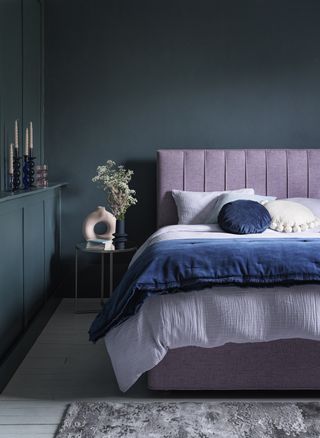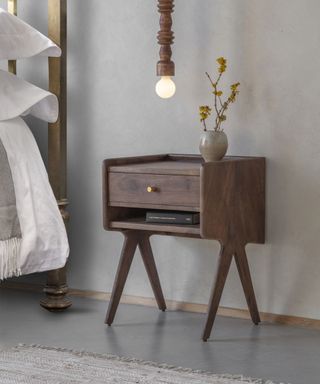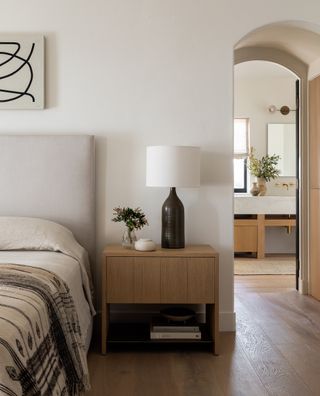The right scent can make a big difference when creating a sleep-friendly bedroom. Why not explore the world of aromatherapy and find the perfect blend to improve your sleep?
Whether you’re introducing scents by combining your favorite flowers, herbs, scent sachets, or essential oils with candles, sprays, or diffusers, choose scents that are calming and relaxing, and avoid scents that are too strong or invigorating. Please avoid.
Our aromatherapy and sleep experts explain how to make your bedroom smell good for sleep and what to avoid to keep your room smelling good and good for sleep hygiene.
Best and worst bedroom scents for sleep
Julia Seamen, sleep science coach at Sleep Advisor, says, “Scents can be helpful or harmful to your sleep, because some scents can help you calm down, while others can be distracting. There’s also the scent, which makes it much more difficult to relax and fall asleep.”
What is the best scent for sleep?
1.Lavender

(Image provided by Furniture Village)
“Lavender is probably the most popular scent to promote a restful night’s sleep,” explains Nate Masterson, aromatherapy expert at Maple Holistics. “Lavender contains compounds called linalool and linalyl acetate, which when inhaled have a relaxing and calming effect on the central nervous system, making it an ideal scent to promote sleep.”
You can make a DIY linen spray for your bedding using about 20 drops of fine lavender essential oil mixed with water in a spray bottle. This way, the lavender scent will soothe you and lull you to sleep the moment you put your head on the pillow.
Alternatively, you can place dried lavender in a sachet under your pillow, on your bedside table, or hang it above your bed.
2. Chamomile

(Image credit: Atkin and Time)
“Apigenin is a substance found in chamomile that has potentially sedative properties. Apigenin binds to benzodiazepine receptors in the nervous system and promotes relaxation. This means that the scent of chamomile can help you relax before going to bed. ,” says Nate Masterson. “There’s something comforting about the scent of chamomile. Whether it’s incense or tea, chamomile is a favorite bedtime scent.”
If you drink chamomile tea to induce sleep, consider planting an indoor herbal tea garden. This not only allows you to consume this herb, but if you keep it in your bedroom, the natural scent of this plant will bring a subtle scent to your room, which can help you sleep.
3. Jasmine

(Image credit: Graham & Brown)
“The scent of this flower is sweet and pleasing to everyone’s senses. In addition to helping you relax and sleep better, it can effectively relieve stress and is often used as a way to reduce symptoms of depression. used,” says Nate Masterson. “Benzyl acetate, linalool, and benzyl alcohol are the compounds that give jasmine its therapeutic abilities.”
If you grow jasmine, consider pruning some and planting them in decorative vases next to your beds.
4. Grapefruit

(Image credit: Howe London)
“Grapefruit, specifically ruby grapefruit and dark pink grapefruit, contain lycopene, an antioxidant that promotes sleepiness,” explains Nate Masterson. This makes it a great scent to fall asleep to.
“Additionally, the scent of grapefruit helps regulate blood pressure levels and has been shown to be an effective way to reduce stress.”
We love the scent of this Grapefruit Tealight Candle Pack from Walmart.
What is the worst scent for sleep?
“Some scents can increase your alertness. These scents stimulate the same nerves that are activated when you use scented salts,” says Julia Seamen. “Although not very strong, these scents can wake you up.”
Therefore, to avoid stimulating wakefulness at bedtime, avoid scents such as:
1. Lemon and orange

(Image credit: Etch Design Group/Avery Nicole)
“Lemon has a fresh, zesty scent that hits the nose with a smooth, crisp feel, but it may actually have an energizing effect on the brain. That’s why we think lemon is one of the worst scents for sleep. “I don’t say it because of the smell, but rather because it can wake you up,” says Nate Masterson.
“Like lemons, oranges have an energizing effect on the brain,” Nate continues. “This scent stimulates our nervous system and boosts our energy. While it’s effective during the day, it’s not the ideal scent to use in your nighttime routine.”
2. Peppermint

(Image credit: Katie Hodges/Haris Kenjar)
Peppermint has a unique aroma and is known to have various effects on the brain, including promoting memory recall and alertness.
That’s because the scent of peppermint, primarily menthol, stimulates areas of the brain responsible for attention, including the hippocampus, which controls mental clarity and memory.
You can also layer fragrances to create personalized blends. Creating a signature scent can evoke a sense of familiarity and security in your bedroom, signaling to your brain that it’s time to relax and unwind.
“Establishing a consistent bedtime ritual is just as important,” says Michael Lowe, certified master life coach and founder of Positive Thinking Minds. “A familiar routine signals that rest is imminent and prevents the mind from going into worry mode.”

